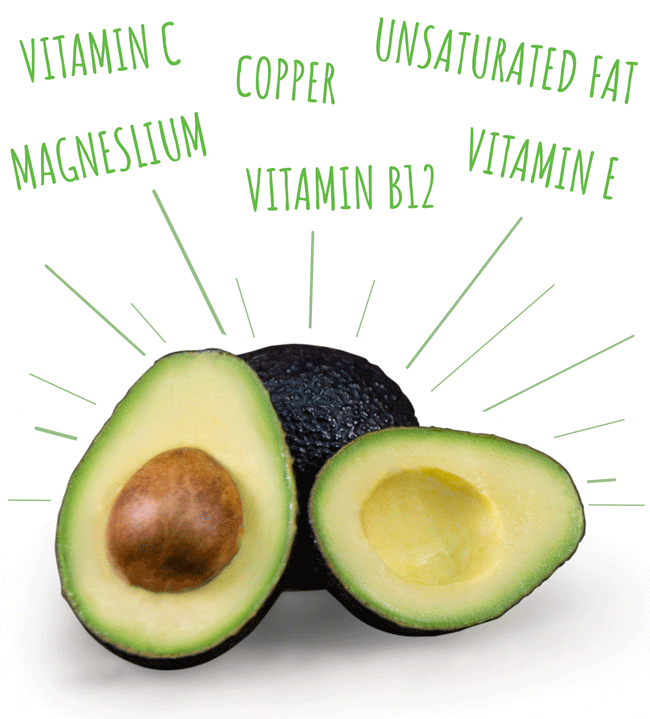Avocados are increasingly recognized for their potential role in weight management and body composition improvement.
As a nutrient-dense food rich in monounsaturated fats, fiber, and bioactive compounds, they may promote satiety, enhance fat distribution, and complement healthy lifestyles. Below, we synthesize key findings from a broad base of studies with varied designs and approaches to provide evidence-based insights for health professionals.
Nutritional Profile of Avocados
One-third of an avocado provides 6% DV B6, 4% DV vitamin C, 10% DV folate, 136 mcg of lutein, 4% DV magnesium, and 10% DV copper. They are naturally low in saturated fat and contain no sodium or added sugars, aligning with MyPlate recommendations to prioritize nutrient-dense foods. Avocados provide 5 grams of monounsaturated fat (MUFA) per serving. A systematic review of 28 clinical trials found that eating high MUFA-containing meals was associated with reduced abdominal fat and central obesity.

Avocados are also a good source of fiber. A study of 345 adults with overweight or obesity consuming a calorie-restricted diet found that greater self-reported fiber intake best-predicted weight loss among study participants. During the POUNDS Lost trial, participants consumed 750 fewer calories daily for six months.
Research Highlight: Observational Data
Several observational studies highlight avocados’ potential role in supporting healthy body weight and composition. In a study of over 55,000 Seventh-Day-Adventist adults, researchers reported that regular avocado consumption, assessed by a food frequency questionnaire, was linked to a lower risk of becoming overweight or obese.
Another large observational study of more than 27,000 adults found that people who eat avocados, on average, consumed slightly more than half a medium avocado per day yet weighed 7.5 pounds less and had smaller waist circumferences than non-consumers.
Two different observational studies conducted in Australia also report similar findings:
- Specifically, after adjusting for other lifestyle factors, researchers reported in a study of 12,153 adults that avocado consumption was associated with lower body weight, body mass index (BMI), and waist circumference.
- The other study involved 2,736 participants and revealed that individuals who consumed avocados exhibited lower BMI, waist circumference, plasma glucose levels, HbA1c, and higher HDL cholesterol than non-consumers. Participants had a daily avocado intake of 25 grams or 1/6 of a medium avocado.
Research Highlight: Free-living efficacy studies
In the Habitual Diet and Avocado Trial (HAT) study, 1008 participants with abdominal obesity consumed one large avocado daily for six months. Despite the extra calories from the avocados, there were no significant increases in body weight or visceral adipose tissue compared to those consuming their habitual diet. Participants were not provided nutrition education or guidance on dietary swaps. This research supports the idea that avocados can be incorporated into a regular diet without contributing to weight gain or increased belly fat, even when consumed daily. Furthermore, modest reductions in LDL cholesterol and enhanced dietary adherence were observed. Specifically, the intervention led to a 4.74-point increase in healthy eating index scores. Avocado supplementation increased self-reported vegetable intake, improved fatty acid ratio, and reduced sodium, refined grains, and added sugars. Those in the avocado group also had increased potassium and fiber intake and decreased consumption of animal protein.

In another study conducted at the University of California San Diego, researchers provided MyPlate nutrition education in a clinical trial of 72 Hispanic American (97% Mexican) families combined with one of two avocado intake levels (3 avocados/family/week vs.14 avocados/family/week). Despite the extra calories, avocado allotment did not change body weight, BMI, or waist circumference.
Research Highlight: Physical Activity – the other side of the energy balance equation
Eating healthy and increasing physical activity prevents weight gain and promotes weight loss. Avocados are nutrient-dense and can be included in a healthy eating pattern. Interesting findings from a randomized controlled trial involving 72 Hispanic families show that increased avocado consumption was associated with higher reported levels of physical activity over six months.

Satiety and Appetite Regulation
According to research studies, eating avocados may help with management by regulating satiety and appetite. It may be attributed to dietary fiber, which adds bulk to the diet and can promote a feeling of fullness faster, which can increase satiety and help manage weight.
In a clinical trial of 31 adults with overweight or obesity, scientists found that eating a whole avocado as part of a breakfast meal, compared to a meal with no avocado, suppressed hunger and improved meal satisfaction. Postprandial increases in hormones such as GLP-1 and peptide YY3-36 were identified as mediators of these effects.

Results from a second clinical study of 26 people showed that when approximately one-half of a fresh avocado was added to a lunch consisting of a salad with Italian dressing, a baguette, and cookies, participants felt more satisfied and had less desire to eat following the meal. The participants also experienced a lower immediate rise in insulin levels than when the same lunch was eaten without avocados. Post-meal insulin levels were also blunted when participants replaced part of the Italian dressing and cookies with one-half of an avocado, compared to when they ate the same lunch with no avocado.
Limitations and Need for Further Research
Despite promising evidence, the research mentioned in this summary has limitations. Some studies rely on self-reported dietary data, which can introduce bias. Observational studies establish associations, but not causation, and intervention studies often have small sample sizes that cannot be translated to all audiences. The Avocado Nutrition Center funded some of the studies.
Practical Applications for Clients
For health professionals advising clients on weight management, avocados offer multiple benefits:
- Enhanced Satiety and Energy Balance: Recommend avocados as a nutrient-dense food to manage hunger and support sustained energy levels.
- Reduce Total Calories: Encourage substituting avocado for higher-calorie ingredients in recipes like spreads. As a bonus, this swap also replaces saturated fats with unsaturated oils for better heart health. Substituting fresh, healthy avocado in sandwiches, on toast, or as a spread in place of many other popular foods may help reduce the intake of calories, fat, saturated fat, sodium, and cholesterol.
- Improve Diet Quality & Meet Nutrient Needs: MyPlate recommends prioritizing fruits and vegetables by ensuring they fill half the plate. One avocado counts as one cup of vegetables from the 2-3 cups recommended daily for adults.
Conclusion
Avocados are versatile and nutrient-rich foods that support weight management and may enhance fat distribution, improve satiety, and complement active lifestyles.
Health professionals should tailor recommendations to individual client needs, leveraging avocados’ unique nutritional properties and flavor profiles to support sustainable and effective weight management outcomes.





